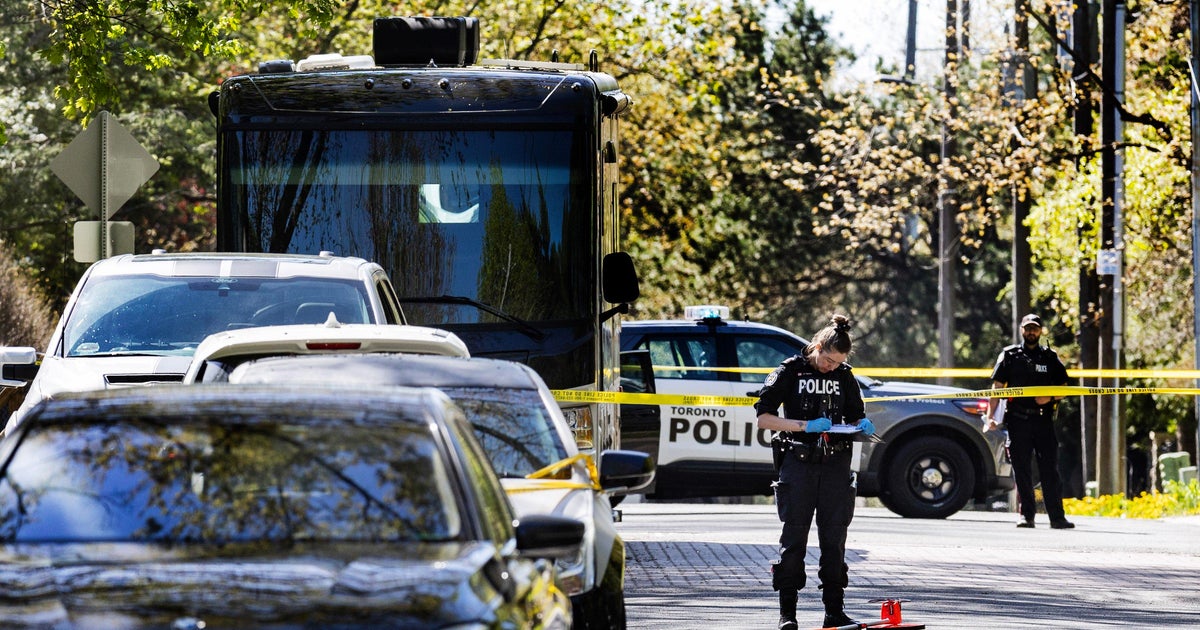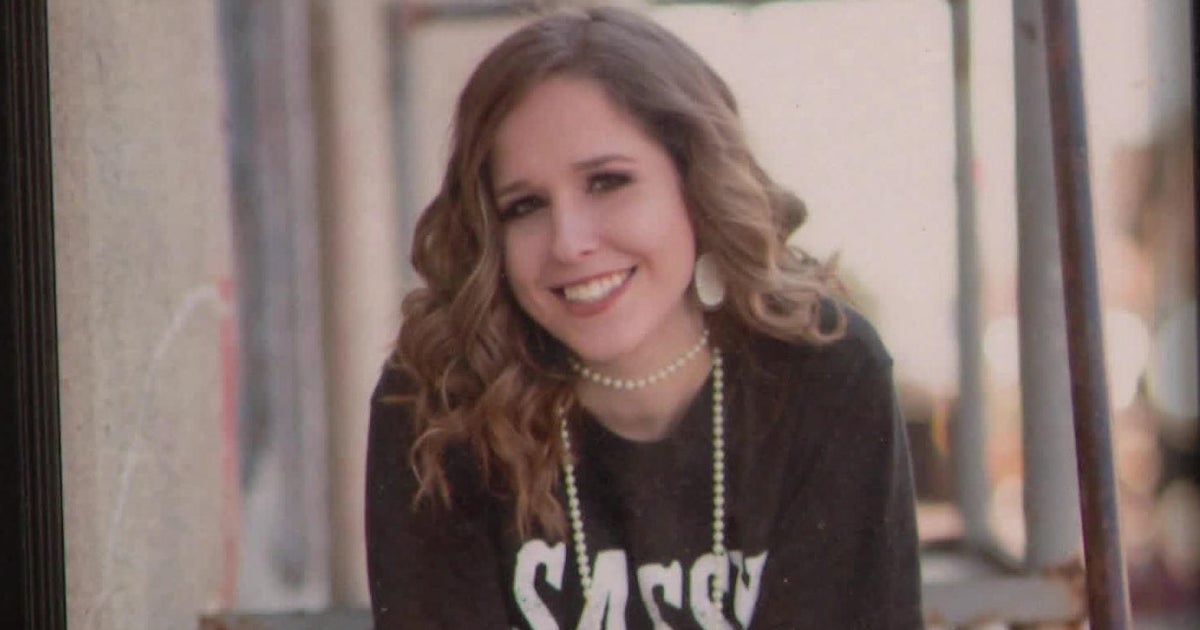CBS News
Drake’s security guard injured in shooting outside rapper’s Toronto home, police say

A security guard for the rapper Drake was injured in a shooting outside Drake’s Toronto home overnight, police said Tuesday.
The shooting was reported at about 2 a.m. local time, Inspector Paul Krawczyk with the Toronto Police Service said in a news conference. The security guard, who has not been identified, was hospitalized and remains in serious condition, Krawczyk said. He did not share information about the guard’s injuries.
The shooting comes amid a rap beef between Drake and Kendrick Lamar. One of Lamar’s tracks featured Drake’s Toronto home as its cover art.
Krawczyk said police “cannot speak to a motive at this time.”
He also said he could not confirm if Drake was home at the time of the shooting, but said police were in touch with the rapper’s team and that they were cooperating with the investigation.
Andrew Francis Wallace/Toronto Star via Getty Images
The guard was standing outside the home’s gates when he was shot, Krawczyk said.
A vehicle was involved in the shooting, but Krawczyk said he could not yet classify it as a drive-by shooting.
Throughout the news conference, Krawczyk emphasized that information was “very limited” because the investigation was in its early stages. He said officers would be canvassing the neighborhood to speak to witnesses and were seeking to collect video footage.
While police have already “collected some video evidence which captures the incident,” he said he could not provide descriptions of the vehicle or suspects at this time.
“We’re dealing with video quality issues,” Krawczyk said. “As we have information and we’re able to analyze video better then we’ll be able to provide more information.”
CBS News
Mystery of New York couple’s 1980 disappearance unravels as team finds missing car in Georgia

NEW YORK — The mystery behind a wealthy New York couple’s disappearance 44 years ago is starting to unravel.
Charles and Catharine Romer vanished while driving home to Scarsdale from Florida in 1980, but a car recently found in a Georgia pond is the break that eluded investigators for decades.
Water search team used sonar to crack cold case
Shelly McKinley works with the Sunshine State Sonar Team, which tries to crack cold cases by using sonar to search water for vehicles of missing people.
“We make our maps and one by one we start from where they were last seen and kind of work our way out,” McKinley said.
The team decided to investigate the disappearance of the Romers, who vanished after spending a night at a hotel in Brunswick, Georgia — more than 900 miles from their home on Popham Road in Scarsdale.
Friday, in the pond directly behind the hotel, the Sonar Team located the missing couple’s Lincoln Continental. After the pond was drained, human remains were found inside.
“We all just figured … somebody followed them and robbed them”
CBS News New York
Reports said divers searched the pond in 1980. It’s possible they simply missed what modern sonar was able to detect.
“As dark and murky as that water, and as muddy as they reported it was, it’s likely that it just got missed,” said McKinley.
“We never knew what happened to any of them. We just all figured somebody had, with all the money they had, somebody followed them and robbed them,” said Andy Mavromat, a former clerk at the hotel.
Many people at a senior center near Scarsdale remember the case.
“They were missing, and they were investigating it as a criminal situation and not an accidental situation,” said Reva Carapella.
The discovery now has investigators thinking Charles Romer may have accidentally driven into the pond. They will continue the probe to give the Romer family the answers they’ve been looking for for decades.
CBS News
Restaurant’s new recipe cost Texas college student her life, parents say. Now they are on a mission to make changes.

NORTH TEXAS — Twenty-three-year-old Alison Pickering knew to watch out for peanuts.
It was a discovery her family made the day she came home from preschool with hives.
“She said, ‘well, a friend of mine shared with me a chocolate Jiff sandwich.’ And I was like, ‘Oh!'” recalls her mother, Joy Pickering, “and it became evident she had a peanut allergy.”
“She would feel it in her lips and in her throat and so we would take trips to the ER,” said her father, Grover Pickering.
Thankfully, those trips to the hospital were rare.
“She was always very very careful. She rarely ate cookies that were not mine,” said Joy Pickering.
Her parents said that caution was evident as she prepared for a first date just days before her graduation last year from Tarleton State University in Stephenville last year.
Alison, they said, chose a restaurant she’d been to before.
She ordered the mahi-mahi, a dish she’d eaten there before.
“She would repeatedly go to the same restaurants and order the same dishes, you know. And that was a common thing,” said her father.
What Alison and even the wait staff didn’t know, the Pickerings said, was that the recipe had changed. Peanut sauce had been added.
“She took a few bites, realized something was wrong,” said Grover Pickering. “She did her Epipen. The ambulance came. She actually walked to the ambulance talking to them, but somewhere along the way things went downhill.”
Alison never woke up.
“It’s tragic and it doesn’t need to happen to anyone else,” he said.
The Pickerings are now on a mission to raise awareness of the seriousness of food allergies.
“We would love to see more done to make wait staff and patrons aware,” said Joy Pickering.
The Texas Legislature last year passed the Sergio Lopez Food Allergy Awareness Act to improve training and communication among restaurant kitchen workers.
They’re calling for clear, consistent communication at restaurants and comprehensive training for all restaurant staff.
They’re hoping to see that expanded to all restaurant staff.
They’re also interested in working with the Texas Restaurant Association.
“To determine what guidelines could be put in place to help restaurants have better communication to their customers as far as ingredients, much like labels on grocery store items you buy,” said Grover Pickering.
It’s a message they’re certain will spare others from the loss they suffered.
“I know we’re going to save lives by doing this,” said Joy Pickering.
CBS News
Walmart the latest big corporation to scale back DEI policies after pressure from conservative activists

Walmart, the world’s largest retailer, is rolling back its diversity, equity and inclusion policies, joining a growing list of major corporations that have done the same after coming under attack by conservative activists.
The changes, confirmed by Walmart on Monday, are sweeping and include everything from not renewing a five-year commitment for an equity racial center set up in 2020 after the police killing of George Floyd to pulling out of a prominent gay rights index. And when it comes to race or gender, Walmart won’t be giving priority treatment to suppliers.
Walmart’s moves underscore the increasing pressure faced by corporate America as it continues to navigate the fallout from the U.S. Supreme Court’s ruling in June 2023 ending affirmative action in college admissions. Emboldened by that decision, conservative groups have filed lawsuits making similar arguments about corporations, targeting workplace initiatives such as diversity programs and hiring practices that prioritize historically marginalized groups.
Separately, conservative political commentator and activist Robby Starbuck has been going after corporate DEI policies, calling out individual companies on the social media platform X. Several of those companies have subsequently announced that they are pulling back their initiatives, including Ford, Lowe’s, Tractor Supply and Harley-Davidson.
But Walmart, which employs 1.6 million workers in the U.S., is the largest one to do so.
“This is the biggest win yet for our movement to end wokeness in corporate America,” Starbuck wrote on X, adding that he’d been in conversation with Walmart.
Walmart confirmed to The Associated Press that it will better monitor its third-party marketplace items to make sure they don’t feature sexual and transgender products aimed at minors. That would include chest binders intended for youths who are going through a gender change, the company said.
The Bentonville, Arkansas-based retailer will also be reviewing grants to Pride events to make sure it isn’t financially supporting sexualized content that may be unsuitable for kids. For example, the company wants to makes sure a family pavilion isn’t next to a drag show at a Pride event, the company said.
Additionally, Walmart will no longer consider race and gender as a litmus test to improve diversity when it offers supplier contracts. The company said it didn’t have quotas and won’t do so going forward. It won’t be gathering demographic data when determining financing eligibility for those grants.
Walmart also said it wouldn’t renew a racial equity center that was established through a five-year, $100 million philanthropic commitment from the company with a mandate to, according to its website, “address the root causes of gaps in outcomes experienced by Black and African American people in education, health, finance and criminal justice systems.”
And it would stop participating in the Human Rights Campaign’s annual benchmark index that measures workplace inclusion for LGBTQ+ employees.
“We’ve been on a journey and know we aren’t perfect, but every decision comes from a place of wanting to foster a sense of belonging, to open doors to opportunities for all our associates, customers and suppliers and to be a Walmart for everyone,” the company said in a statement.
The changes come soon after an election win by former President Donald Trump, who’s criticized DEI initiatives and surrounded himself with conservatives who hold similar views, including his former adviser Stephen Miller, who leads a group called America First Legal that has challenged corporate DEI policies. Trump named Miller to be the deputy chief of policy in his new administration.
A Walmart spokesperson said some of its policy changes have been in progress for a while. For example, it’s been moving away from using the word DEI in job titles and communications and started to use the word “belonging.” It also started making changes to its supplier program in the aftermath of the Supreme Court affirmative action ruling.
Some have been urging companies to stick with their DEI policies. Last month, a group of Democrats in Congress appealed to the leaders of the Fortune 1000, saying DEI efforts give everyone a fair chance at achieving the American dream.











